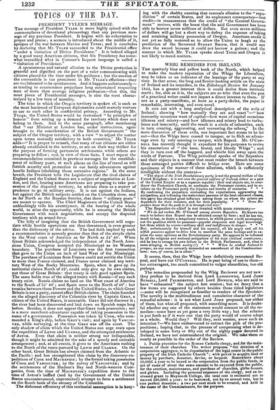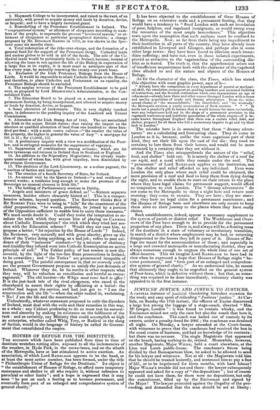WHIG REMEDIES FOR IRELAND.
Tue quarterly blue and yellow book of the North, which helped to make the modern reputation of the Whigs for Liberalism, may be taken as an indicator of the leanings of the party at any
time. In that sense, the long and Senior-looking article on the state of Ireland and its remedies, in the Edinburgh Review for January
1844, has a greater interest than it could derive from intrinsic merit ; for, able as it is, the subjects are so trite that even the pen of a practised writer could not impart a direct interest to them. If not as a party-manifesto, at least as a party-feeler, the paper is remarkable, interesting, and even novel.
It sets out with a long analytical description of the evils of Ireland ; showing "how mutually they act and react"—" how insecurity occasions want of capital—how want of capital occasions idleness and misery—and how idleness and misery lead to turbu- lence and insecurity, until the result is a circle of calamities, each. in turn creating, aggravating, and recreating the others; In the mere discussion of these evils, one important fact seems to be let out—that the Whigs have ceased to tamper, or to filch an advan- tage even by only seeming to tamper, with Repeal. Mr. O'Con- NELL has recently thought it expedient for his purposes to revive his execrations of "the base, brutal, and bloody Whigs" ; and they in turn cast off the haggard, and whistle him away upon the winds of Fortune. The Whig periodical speaks of the Repealers and their objects in a manner that must render the breach between those estranged parties difficult to bridge over. Here are some specimens of the manner of these allusions, which is sufficiently intelligible without the context— "The object of the Irish Revolutionary party is not the general welfare of the United Kingdom; it is not even the general welfare of Ireland, either as a part of the United Empire or as a separate republic : thew real objects are, to over- throw the Protestant Church, to confiscate the Protestant estates, and to re- taliate on the Protestant party the injuries and insults of centuries. * • " By confirming the prejudices, misleading the expectations, aggravating the antipathies, and inflaming the malevolent passions of the least educated classes, this Arty has obtained great influence among those on whom the priests are dependent for their incomes, and for their popularity. • • • Some Re- peak's know that the path to it is through civil war."
The Repealer-in-chief is not treated with more ceremony-
" We do not reckon Mr. O'Connell among sincere Repeaters. He knows too much to believe that Repeal can be obtained except by force ; and he has too, much to lose, to desire a sanguinary contest, in which power soak accompany, not the qualities which he possesses—popular eloquence and legal knowledge but those which he wants—military skill and indifference to danger. * • • But, unfortunately for himself and his country, all his angry and all his selfish passions appear to drive him to manifest the same feelings and to ex- press the same opinions as the Revolutionary party. He appears to be inflamed by all the religious and national antipathies of his least civilized countrymen ; and he has to avenge his own failure in the British Parliament, and, what is more stinging, in British society (1) • • When he wished Ireland to prosper, no one more earnestly demanded an amendment of the Combination- laws : now, of course, he is silent."
It seems, then, that the Whigs have definitively renounced Re- peal, and have cut O'CONNELL. He is past being of use to them— too extravagant, too much committed to vulgar absurdities, too old perhaps.
The remedies propounded by the Whig Reviewer are not new they profess to be derived from Lord LANSDOWNE, Lord J0101 RessaLL, Lord PALMERSTON, and Lord Howlett, who are said to have "exhausted" the subject last session; but we fancy. that a few items are suggested by others besides those titled legislators —some will be recognized as familiar to readers of the Spectator. The novelty is the multitudinous and cumulative character of the remedial scheme : it is not what Lord JOHN proposed, nor either of them, but what all proposed, with something more. It is doubt- ful whether any one of the statesmen would consent to all the re- medies—some have as yet gone a very little way ; but the scheme is put forth as if it were one that the party would of course adopt as a whole. Would they ? Will they, next session, avow such an intention ?—We have endeavoured to extract the pith of the pro- positions; hoping that, in the process of compressing what is de- veloped in some forty or fifty out of the eighty pager devoted to Ireland, we have not mistranslated the original. We taktribem as nearly as possible in the order of the Review.
1. Public provision for the Roman Catholic clergy, and for the main- tenance of their churches. The writer propose.s "the creation of a corporation aggregate, to be depositaries of the legal, estate in the public property of the Irish Catholic Church" ; with power to acquire land or money by purchase, donation, devise, or bequest. Somewhere about 50,0001. a year to be issued to the corporation from the public funds, in aid of sums of about the same amount to be expected from the public, for the erection, maintenance, and purchase of churches, glebe-houses, and glebes. Including the personal expenses of the clergy, and an in- creased grant to May nooth College, the total cost is estimated not to exceed 320,000/. a sear; to be bestowed, not by an annual vote, but in one perfect donation ; a two per cent stock to be created, and held in the name of the Commissioners, for the purpose.
2. Maynooth College to be incorporated, and raised to the rank of an university, with power to acquire money and lands by donation, devise, or bequest; and to have a largely increased grant.
3. Remodelling of the Protestant Establishment in Ireland. The "congregational system," or allotment of clergymen according to num- bers of the people, to supersede the present " territorial system," or al- lotment of clergymen to particular geographical districts ; a change proposed by Mr. Bnioamst RARING in 1835, as was shown in the Spec- tator some six months since.
4. Total redemption of the tithe-rent-charge, and the formation of a general fund for the support of the Protestant clergy. Cathedral lands and useless glebes to be sold in aid of the funds. The sale of the Ca- thedral lands would be particularly facile in Ireland, because, instead of allowing the lease to run against the life of the Bishop in expectation of a large fine at its expiry, it is most usual to anticipate part of that fine every year, by annually renewing the twenty-one years lease.
5. Exclusion of the Irish Protestant Bishops from the House of Lords. It would be impossible to admit Catholic Bishops to the House ; and therefore, to place Catholics and Protestants on an equality, the Protestant Bishops should be excluded.
6. The surplus revenue of the Protestant Establishment to be paid over, as proposed by Lord MELBOURNE'S Administration, to the Con- solidated Fund.
7. The Education Board to be placed on a more independent and permanent footing, by being incorporated, and allowed to acquire money or lands by donation, devise or bequest.
8. Some alteration of land-tenure. This is very slightly touched upon, in deference to the pending inquiry of the Landlord and Tenant Commission.
9. Alteration of the Irish Stamp Act of 1842. The act assimilated
• the Irish to the unjust British duties; thus raising the impost on the absolute or qualified alienation of laud from one hundred to three hun- dred per tent; with a scale contra valorem—" the smaller the value of the property, the higher in general the value of duty " : a mortgage for 501. is 1L; for 15,0001., 15/.
10. A preliminary inquiry with a view to a modification of the Poor- law, and to stringent measures for the suppression of vagrancy.
11. Suppression of combinations among artisans; which are far more tyrannous and ruinous in Ireland than in Scotland or England.
12. An addition to the Stipendiary Magistrates; the already inade- quate number of whom has, with great impolicy, been diminished by the present Government.
13. The abolition of the Lord-Lieutenancy, as a useless pageant, the "nucleus of faction and intrigue."
14. The creation of a fourth Secretary of State, for Ireland.
15. An annual visit by the Queen to Ireland—" a real residence of several weeks ; a residence long enough to make the presence of the Sovereign no unusual element in Irish life."
16. The holding of Parliamentary sessions in Dublin.
"Angels and ministers of grace defend us!"—Sixteen separate measures, besides others obscurely hinted at ! This is a compre- .hensive scheme, beyond question. The Reviewer thinks that if Sir ROBERT PEEL were to bring in "bills" for the enactment of the chief propositions, "he would, probably, be joined by a portion of the Opposition sufficient to enable him to carry these measures." We must needs doubt it. Could they resist the temptation to re- taliate the trick which they accuse him of playing on CANNING about Catholic Emancipation ? the trick which they tried last ses- sion with the Education scheme ? Would they not oust him, to propose a better, "for rejection by the House of Lords " ? Indeed, the Reviewer, very naturally and with great alacrity, gives up the idea of the iories doing anything, as a bad job ; refers to past evi- dence of their "insincere" conduct—" by a mixture of obstinacy
and timidity they infused even into Catholic Emancipation an active principle of evil." The Fabian policy of last session is noiv dis- covered, by the light of the too-late State prosecutions in Ireland, to be cowardice ; and "the Tories" are pronounced incapable of doing good. "The painful consequence is, that we scarcely wish to see the present Government propose to satisfy the just demands of
Ireland. Whatever they do, be its merits in other respects what they may, will be valueless as conciliation and hurtful as encou- ragement." The old burden—the Whigs must come back to office! It is the jest-book tale of the rival clergymen, who raced to the churchyard to assert their rights by officiating at a burial : the swifter had begun the service, and had just got to "I am the resurrection and the life "—when the other rushed in, exclaiming, 4' No! lain the life and the resurrection."
Undoubtedly, whatever statesman proposed to settle the disorders of Ireland, must deal with the evils and their remedies in this way,
as a whole : any Cabinet professing to do so must teat its earnest- ness and sincerity by staking its existence on the fulfilment of the task : and as certainly, any Ministry that could accomplish so high an enterprise, whether called Whig, Tory, or Radical in the slang of faction, would in the language of history be called the Govern- ment that consolidated the empire.























 Previous page
Previous page